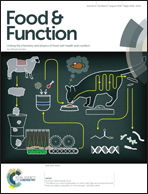Targeting heme oxygenase-1 by quercetin ameliorates alcohol-induced acute liver injury via inhibiting NLRP3 inflammasome activation†
Abstract
Alcoholic hepatitis (AH) is characterized by inflammation and necrosis of liver tissue caused by excessive alcohol consumption and it even causes organ failure sometimes, in which oxidative stress plays an important role. Quercetin is a bioactive flavonoid in the class of polyphenols with a free-radical scavenging ability and anti-inflammatory activity. Recently it has aroused great interest because of its potential benefits in the prevention and intervention of cancer, cardiovascular abnormalities, neurodegenerative diseases, metabolic disorders and liver fibrosis. However, its role in alcoholic liver injury is still unclear and needs to be elucidated. Through database analysis and serum measurements, we found that there was a decline in the level of heme oxygenase-1 (HO-1) in patients with acute alcoholic hepatitis compared to healthy controls. Quercetin could elevate the expression of nuclear factor E2-related factor 2(Nrf2)/HO-1 and ameliorate ethanol-induced acute liver injury in rats. Moreover, this protective effect of quercetin could be diminished when combined with the HO-1 inhibitor ZnppIX which demonstrated a critical role of HO-1 in quercetin's hepatoprotection. The underlying mechanism of quercetin's benefit on the liver may be explained by its anti-oxidant properties and inhibitory effect on the ROS/NF-κB/NLRP3 inflammasome/IL-1β and IL-18 pathway by inducing HO-1. Meanwhile, quercetin also upregulated the anti-inflammatory factor IL-10, while it was found uncorrelated with HO-1 expression. In conclusion, quercetin can preserve the function of the liver in acute alcoholic injury by upregulating the expression of IL-10 and HO-1 and thus inhibiting NLRP3 inflammasome activation and inflammatory factor secretion. In other words, quercetin looks promising as an alternative treatment and HO-1 may be a potential target in the crosstalk of inflammation and oxidative stress in alcoholic liver damage.



 Please wait while we load your content...
Please wait while we load your content...